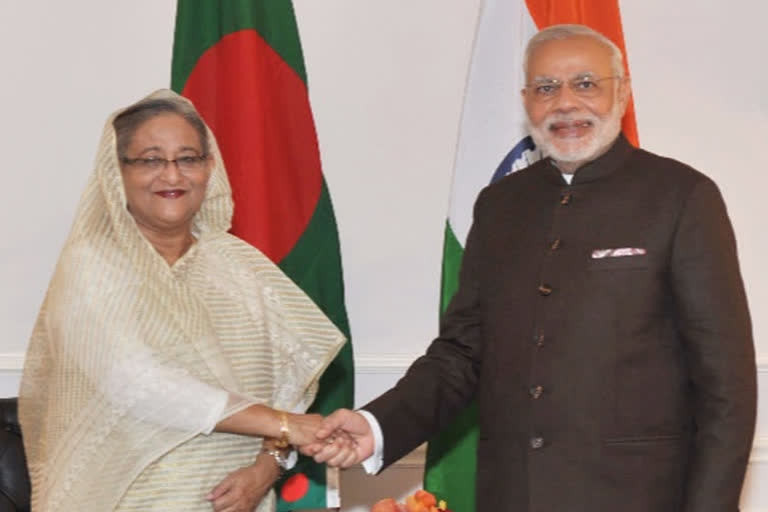Hyderabad: As the COVID-19 pandemic gripped India and the world from early March, Indian Prime Minister Narendra Modi opted to boost his flagging neighbourhood first policy by reviving the largely defunct SAARC forum, to foster a common South Asian response to the pandemic, even setting up a fund and discussing best practices with the neighbours.
However, as Covid-19 cases spiralled across India, propelling it to the global third place in numbers of positive cases, its neighbourhood policy appears to be unravelling at a pace New Delhi had hitherto not expected or imagined. Other than the Maldives, India’s other neighbours from the South Asian Association for Regional Cooperation (SAARC) seem largely unimpressed by New Delhi’s efforts not only to contain the pandemic, but also to sustain regional ties, preferring to look to Beijing for their developmental needs.
Particularly painful for New Delhi is the way the ‘Sonar Adhyay,’ or ‘golden chapter,’ of India-Bangladesh relations, which specially blossomed over the past five years after the Maritime and Land Boundary Agreements resolved those thorny issues between the two countries, seems to have unravelled, very fast.
A measure of New Delhi’s concern on this front is apparent from its decision to send a new envoy to Dhaka and bring back incumbent envoy Riva Ganguly Das, barely 16 months after she went there. Ostensibly, Das is coming back on promotion to Secretary rank, but it is a fact that the clout of the Indian High Commissioner to Bangladesh is not confined by the official’s rank. It is a highly political posting, even though senior career diplomats have mostly been appointed there. Since the creation of Bangladesh, the Indian envoy is a very important person in Dhaka, with enviable reach. Indian High Commissioners to Bangladesh, especially during the tenure of Bangladesh Premier Sheikh Hasina, have always had very close access to the top echelons of power in Dhaka.
Similarly, Bangladesh’s envoys, most recently Syed Muazzem Ali, the previous High Commissioner, enjoyed excellent access to the Modi government in New Delhi and earlier ones.
But the question of excellent access stems from the closeness between the political leadership in the two national capitals. And that has distinctly soured over the past year in Dhaka. Not just at the government level, but the common man in Bangladesh has been deeply offended at the ruling Indian BJP leaders’ rhetoric, calling Bangladeshis ‘termites,’ making it very difficult for Sheikh Hasina to keep up the warmth of the ties. Her government has also been very distressed with provisions in the Indian Citizenship Amendment Act, which singles out Bangladesh, along with Pakistan and Afghanistan, as nations which persecute their minorities.
Read: Bangladesh FM unworried by Indian citizenship law
Infusing a communal flavour into a highly emotional and cultural relationship has not gone down well with Bangladesh. That an economic relationship of over US$10 billion per annum, the largest within SAARC, could not curb Indian majoritarian tendencies have swung the focus away from India.
These distressed ties were reflected in Das not getting an audience with the Bangladesh Premier for over four months, an unheard of snub. Das, who served earlier as Cultural Counsellor in Dhaka, went there in March 2019 soon after Sheikh Hasina’s landslide electoral victory, with expectations of successfully emulating her earlier tenure and taking the bilateral relationship to new highs. She assumed charge as envoy in Bangladesh following Harsh Vardhan Shringla, now India’s Foreign Secretary. But expectations were belied and Das is being replaced in Dhaka by Vikram Doraiswami, also a career diplomat very highly regarded by External Affairs Minister Subrahmanyam Jaishankar, in the hope that ties can regain their emotional warmth and their multi-faceted vitality.
Indian efforts, like handing over 10 broad-gauge locomotives to Bangladesh to revitalise economic and trade ties, barely a week after a significant milestone in bilateral maritime relations with the first shipment of container cargo from Kolkata reaching Agartala via Chattogram (Chittagong) port, pale in comparison with the aggressive development assistance China has recently provided to Bangladesh.
Read: India hands over 10 modern BG diesel locomotives to Bangladesh
These Indian connectivity projects, part of an assistance programme which India offered along with a Line of Credit during Sheikh Hasina's visit to India in October 2019, are not enough to undo the political damage which has forced Dhaka to look away from Delhi toward Beijing to fulfil many vital requirements. These include development of a modern submarine base at Pekua in Cox’s Bazar, to patrol the critical Bay of Bengal, delivery of two submarines to the Bangladesh Navy and, very significantly for India’s Northeast, the contract for a new terminal at Sylhet’s international airport to the Beijing Urban Construction Group Ltd. Sylhet borders Assam.
Continuous Bangladeshi assistance has been hugely responsible for curbing insurgencies in several Northeastern states. With the relationship unravelling, to the extent that Sheikh Hasina has conferred with Pakistani Premier Imran Khan, even discussing the issue of Kashmir, India is likely to face an increasingly difficult security scenario, which will further hinder its economic revival efforts.
The disconnect is even appearing through official statements, as Bangladesh Information minister Hasan Mahmud, talking of multidimensional bilateral cooperation, harked back to the creation of Bangladesh. “India has continued to contribute to the economic development of Bangladesh since its independence,” he said, and “needs to be thanked for its historic role in the great War of Independence,” while the Indian MEA spokesperson, responding to the Pakistani and Bangladeshi Premiers’ talks on Kashmir, described relations with Bangladesh as “time-tested and historic” while appreciating Dhaka’s view that Jammu and Kashmir was India’s “internal matter.”
The mention of Kashmir in Pakistan – Bangladesh talks does not bode well for India as China continues to subtly orchestrate the shifting balances. Can invoking a “glorious past” be enough to save and foster the bilateral relationship? Only time will tell.



